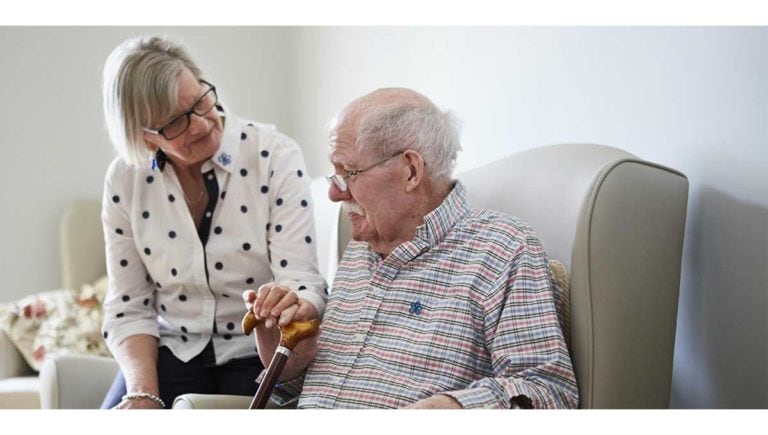When people hear "dementia," they often think of extremely disoriented and forgetful seniors, but living with dementia is a different experience for each person. There may not be many obvious signs and the person could have many good days. Others who live with dementia might become advanced quickly and struggle more.
Regardless of the signs, loved ones can find it very distressing to realize that their elderly parents or relatives are beginning to slip in cognitive function.
When you are assessing your options, you are trying to decide what is the safest option for them. You could send them to a senior facility, but your instincts tell you that being at home is the most comforting place.
For those who often get confused, being in their own home is much less disorienting. In this guide, you'll learn how dementia home care is a great option to consider for your loved one.
Caring for a Relative with Dementia
At first, your loved one might only be expressing minor and rare symptoms of dementia. You and your relatives might attempt to check on them often, take them to their appointments, and do your best to slow down the progression.
It is courageous and generous of you to commit yourself to this kind of care. Whether they express it or not, your loved one with dementia is extremely grateful that you are giving of yourself to their care. Without you, they would be surrendered to the attention of strangers in a strange place.
To best care for them, you will want to prepare yourself with the facts about the disease. Dementia care will look different in every situation, but it is bolstered by some common symptoms and trends.
Below are some behaviors to expect when caring for a relative with dementia.
Dementia Patients Tend to Wander
As a dementia caregiver, one of the most concerning symptoms of dementia can be your loved one's tendency to wander. Wandering can be especially troublesome if your loved one is of very advanced age and has physical ailments that heighten the risk of falls and injuries.
Instead of becoming frustrated, it's best to understand why your loved one is attempting to move. It's common for dementia patients to become restless, bored, and lonely. They may get up and attempt to find someone or fulfill their own needs like finding food.
Unfortunately, the nature of dementia can suddenly leave them confused about their location or where they were trying to go.
It might be difficult, but over time you can begin to understand their needs and mitigate the risks of wandering. If they are restless or bored, try incorporating more exercise and stimulating activities into their daily routine. If they get lonely, try to have someone there more often to watch them and keep them company.
If you are not able to be there constantly, it is smart to install child locks on doors. You could also try hiding essential items like their purse and keys as it could deter them from leaving the house.
In the case that their wandering becomes a huge problem, you could install a security or monitoring symptom that tracks their movements. Let neighbors know of your loved one's behavior and give them emergency contact information. Consider sewing identification of some kind to their clothes in case a stranger comes across them.
Agitation Is a Common Symptom
All things considered, it isn't surprising that a common symptom of dementia is agitation. Your loved one is often disoriented, dealing with physical discomforts, and unable to do many things for themselves. It is important to remember that they do not mean to offend anyone.
This symptom could range from general unhappiness to outright aggressiveness. Often, agitation becomes worse over time.
One of the best ways to help reduce agitation is to remove environmental stressors that make your loved one feel overwhelmed. It might be stressful to have too much noise and clutter, or they might not handle crowds well. Keep their environment constant and familiar by refraining from moving furniture, objects, and pictures.
Support their sense of independence and control as best you can. Allow them to attempt activities on their own if it's safe, but keep dangerous objects out of reach. Also, it can help to avoid caffeine and sugar intake.
During an episode of agitation, it's important to acknowledge your loved one's discomfort and then distract them from the situation with a new conversational subject or activity.
Experiencing Incontinence
One of the hardest symptoms to handle is the slow onset of incontinence that a dementia patient might suffer. It can be hard to experience your loved one losing control of their bodily functions.
It's important to establish a routine that can lessen the occurrence of accidents. Try taking your loved one to the bathroom frequently at regular intervals.
You should also pay attention to their fluid intakes. You want to make sure they do not become dehydrated but pay attention to how much they are drinking. You should also be aware that some drinks, like coffee, can act as diuretics.
You can also limit fluid intake in the evening to lessen the occurrence of accidents at night. If your loved one has the ability to go to the bathroom on their own, make signs that help remind them how to get to the bathroom.
If things progress, you can use incontinence pads to help with cleaning. You can also make sure they wear clothes that are easy to remove and clean.
Paranoia Can Plague Those With Dementia
A similar symptom to agitation is paranoia. Dementia patients can experience hallucinations or become accusatory and suspicious. It's important to not argue with your loved one but acknowledge their distress.
Over time, you may experience patterns in their paranoia. If they often feel like people are following or watching them, you can do your best to reassure them that they are safe and you are there to help. If they think they are being robbed, try keeping money and valuables in an easy-to-access place where they can check them regularly.
In this case, dementia care will look different for everyone. If you need advice on how to deal with your loved one's particular case, you can seek help from a healthcare professional.
Monitor Dementia Progress
As a dementia caregiver, you will need to be flexible and attentive. There are many more symptoms than those listed above. Caring for someone with dementia means monitoring the progression of the disease and adjusting your care.
Dementia is an umbrella term for similar symptoms that can be caused by a wide range of health issues. Dementia causes could be:
- Parkinson's disease
- Alzheimer's disease
- Brain tumors or infections
- Vascular dementia
- Lewy body dementia
- Side effects of medications
- Chronic alcoholism
- Damage to the frontal and temporal lobes of the brain
The progress and symptoms of dementia can be different depending on the cause. Dementia treatment can also differ.
There are medications for treating Alzheimer's as well as non-drug therapies like occupational therapy. In the case of a degenerative disease or irreversible damage, dementia can only be treated as it worsens over time. It's important to be prepared for how the disease progresses.
The aforementioned common symptoms will advance and require increased care. The biggest red flags for dementia progression are forgetting who loved ones are, forgetting how to perform common tasks, and the inability to retain simple and clear information.
You will want to make sure you have plans in place to deal with worst-case scenarios, even if your loved one does not reach a severe stage of the disease.
Professional Dementia Help
Professional dementia home care services are a good alternative compared to home care by a relative. If you and your relatives are not able to care for your loved one, it is important to seek a professional who can help.
Professional dementia help that occurs within your loved one's home will help keep them grounded in a familiar environment. Professional home care benefits can include:
- Help with recreation and supervision
- Keeping your loved one company
- Hygiene and daily routine help
- Housekeeping and shopping
- Meal preparation and eating
- Care that requires a professional such as injections and therapy
Professional home care for seniors can give you the peace of mind you need for your loved one.
Get the Coverage You Want at the Best Rates
Get quotes in minutes and save on the best insurance policies.
Get QuotesWhat If Dementia Home Care Is No Longer an Option
There may come a point when your loved one's dementia becomes too advanced to be treated at home. It's important to recognize when you have reached your limits and need professional help in a safer environment.
Even before this becomes a reality, it's important to become financially prepared for the expense of bringing your loved one to a facility. Assisted living centers can range in amenities and living area sizes as well as expense.
Ask a medical professional about available centers and do your research before you commit. You should also begin working on getting affairs in order if you have not already done so. You might need to pack up your loved one's belongings, sell their home, and set money aside for end-of-life arrangements.
Preparing for Advancing in Age
Dementia home care is a big commitment but is worth it for helping your loved one who is living with dementia. Be patient and educate yourself as much as possible so you can be prepared for anything.
Insurdinary has a wealth of resources for those who are advancing in age or are caring for aging loved ones. If you are in need of guidance surrounding life and health insurance or are looking for financial aid for end-of-life expenses, we are here for you. Check out our blog or contact us for quotes on the best insurance for you.





